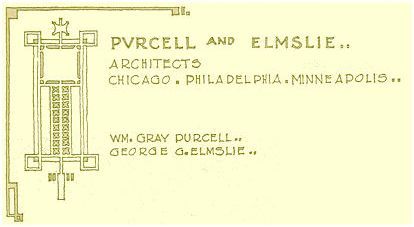 |
firm active: 1907-1921 minneapolis, minnesota :: chicago, illinois |
Sidebar, 9/4/2004
During the 1990s while at the Social Welfare History Archives, University of Minnesota Libraries, I conceived and built the prototype of an automation system designed to support inquiry strategy into archives which may contain millions of individual records and artifacts. This site exists in part because the curator of the Northwest Architectural Archives, Alan Lathrop, generously allowed me to use facsimiles of documents from the Purcell Papers to develop the Windows-based application interface called HyperFind. Materials from a total of three archives units, including (of course) the Social Welfare History Archives as well as the Children's Literature Research Center, were scanned and mounted in various ways to demonstrate the usefulness of HyperFind. I ultimately presented the schematic and some working elements of the system at a national convention of the Society of American Archivists where it was well received. The prototype of HyperFind remains on-line, and even without any sort of advertising still responds to the needs of several hundred or more researchers each month on the same Pentium I 100 that serves the Organica pages.
The pages of this web site have a mix of hard-coded HTML and on-the-fly retrieval through HyperFind. While I have concentrated on creating an immediately useful resource, the underlying automation code has continued to evolve. Now I am taking the next step and creating a third generation of the HyperFind code which will automatically build the three forms of web sites that Organica currently serves. The templates will allow direct selection of images and texts from the database, without any coding required. Scripts will automatically generate the entire site as HTML. This replaces an earlier graphical user interface that was built into HyperFind to facilitate web deployment of the system.
As an aside, I have not been fond of PDFs, but they are now so ubiquitous that HyperFind needs to be altered to accommodate them. My reservations to date have been several. While PDFs are by their nature a controlled form that can, properly applied, prevent alteration of the original image, they also require the Adobe Acrobat reader to be on the remote user's computer. The plug-in is freely available, yet not all people have--in my experience--have it installed. I've always thought that having to go get a plug-in, which sometimes involves rebooting the computer, is an interruption to the research process. I am still working with the PDFs to see what indexing and naming standards can be usefully applied. Once there are enough of them in HyperFind, I am sure that as-yet-unforeseen dynamics will emerge in working with them.
These pages have grown into their present form over the course of nearly ten years. I remember the old days, when all I had to do to set up a web server was load the software, pick up the phone and call the University of Minnesota IT people to tell them what domain name I wanted to use. I chose "archon.lib.umn.edu," a truism whose humor some few people received with a smile (we are all avatars of one thing or another, maybe several at a time). It is a prophetic thing that when moved the site (and my person) away from a Minnesota locale that I selected the domain name "organica.org," because little did I know six years ago I was about to deprive my current employers of the domain they wanted to use.
The Internet is the greatest invention of our lifetimes, barring the appearance of anti-gravity drives and teleportation for humans (electrons can already teleport, according to a recent news item). Like all human endeavors, the best and the worst possible outcomes will undoubtedly be explored. For better or not, it is the primary medium of our time. You have to marvel that for $65 a month, I can sit in my own home with three computers providing web sites to the billions of the world (not all billions; the Wall Street Journal this week reported that the Chinese government is becoming very adept at blocking sites from their people). Presumably they don't reach down to halt access to Prairie architecture, having forgotten that six years ago the equivalent of the Organica home page started out with the wish for a free Tibet and the long life His Holiness the Dalai Lama.